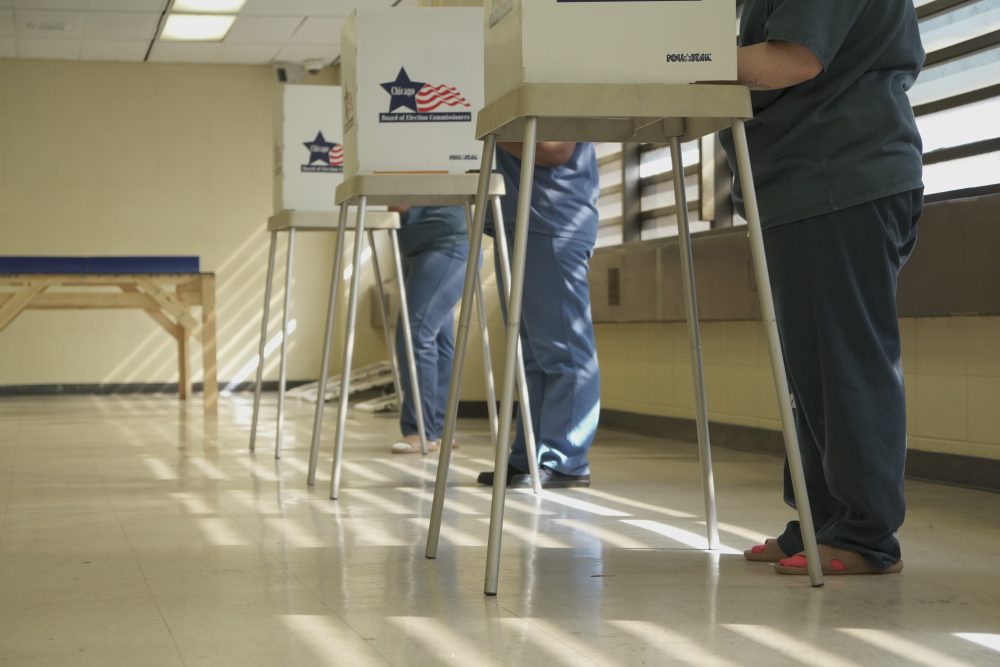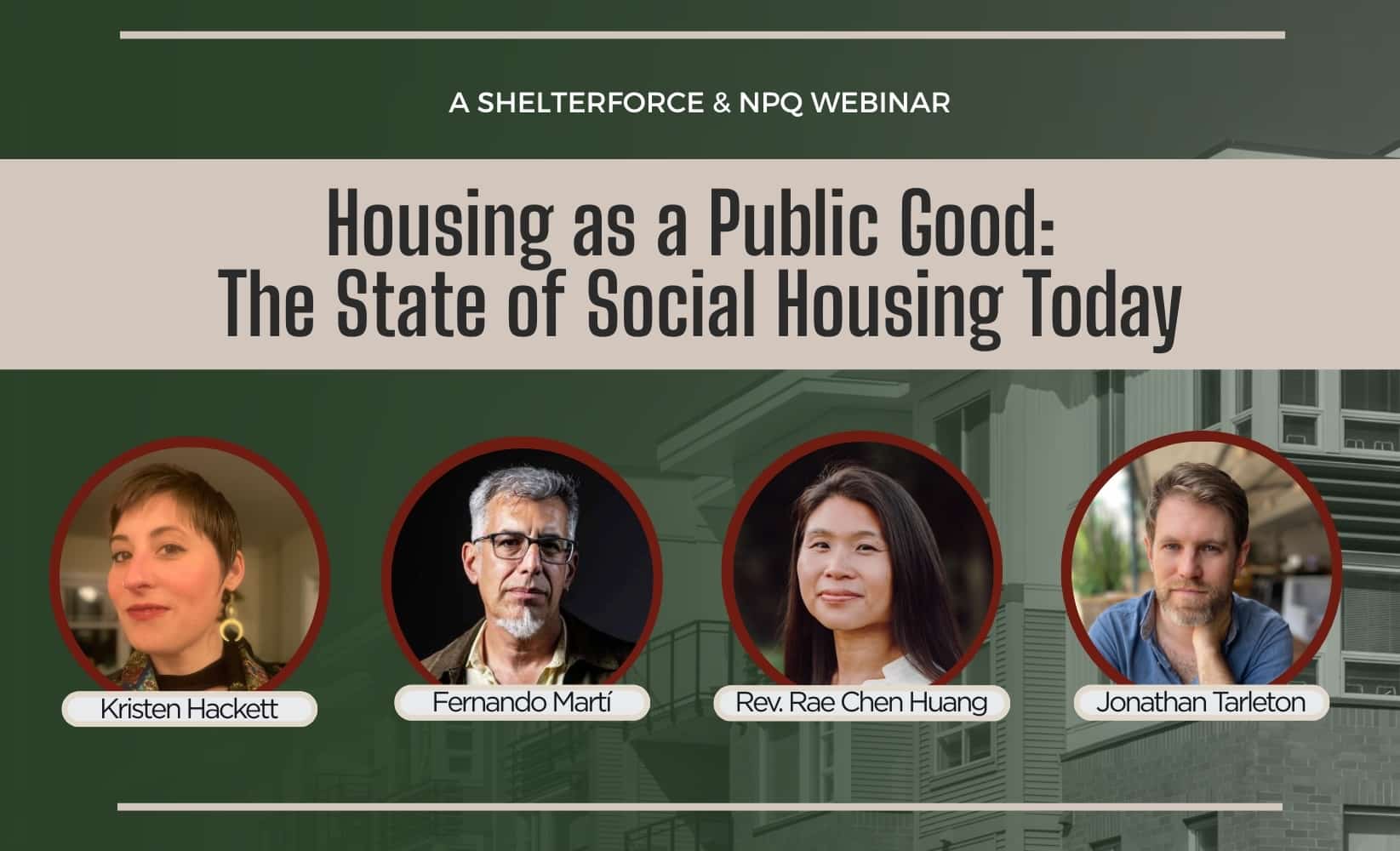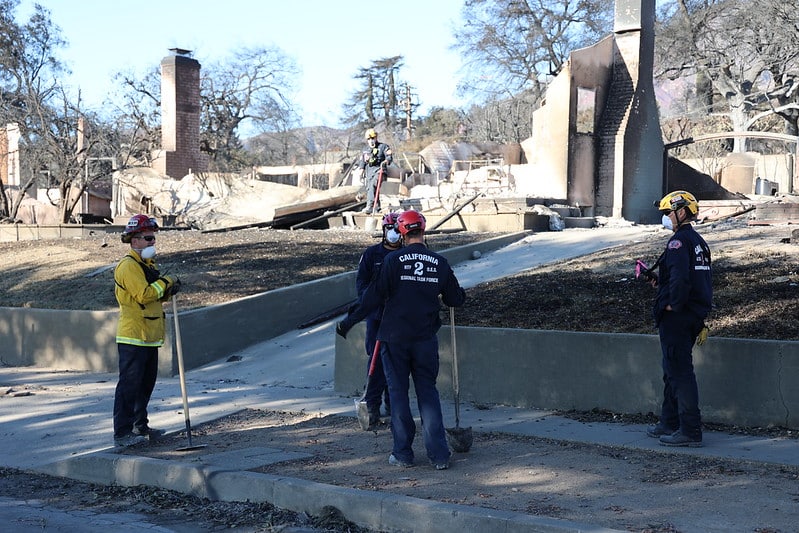Shelterforce tracked down almost three dozen housing-related ballot measures that were up for vote in Tuesday’s general election. Overall, we found that the outcomes were largely positive. In more than half of the measures, the outcomes will benefit housing efforts, tenants, and/or homeowners in some way.
Voters approved more than $1 billion in annual contributions for housing, the biggest (and majority) happening in Los Angeles County. They also agreed to over $275 million in local bonds for things like preserving rental housing, making improvements in public housing, creating or maintaining housing trust funds, and more. But voters also rejected tenant protection efforts in multiple cities and passed measures that criminalize people living on the streets.
We’ve broken down the results of the measures below. Note: These results are unofficial and are subject to change.
Arizona
Statewide
Proposition 312—Voters passed this measure, which will allow property owners to apply for a refund of property taxes in the amount of expenses they incurred as a result of their municipality not enforcing anti-encampment and other nuisance laws. Refunds are limited to the amount of property tax paid. Qualifying expenses might include repairing vandalism or adding fences. The effect is likely to be a combination of more draconian criminalization of people living on the streets and less tax revenue for municipalities to use to house people. Read more
California
Statewide
Proposition 33—A repeal of the Costa-Hawkins Rental Housing Act failed to pass. The act limits the kinds of rent control measures municipalities can pass and prohibits capping rent when a unit becomes vacant. Landlords and Realtors spent over $100 million to defeat Proposition 33, but the fact that YIMBY groups have embraced the empirically disproven idea that rent control limits housing construction may have also played into the loss. As a result, California still has its statewide 10 percent rent cap, and other existing local rent control measures, and municipalities still cannot choose to extend rent stabilization to more units or enact vacancy control. This places a particular burden on disabled tenants, as the older buildings that are covered are rarely accessible. Read more in Cal Matters.
Prop 5—Voters rejected this measure, which, if passed, would have reduced the threshold to approve local bonds to fund affordable housing, supportive housing, or public infrastructure initiatives from two-thirds to 55 percent, and added various accountability requirements to those bonds. Legislative analysis showed that 20 percent to 50 percent more local bond measures would have passed under Proposition 5. Opponents framed it as a measure that would increase property taxes, while supporters argued it would remove the ability of a minority to decide how tax dollars were spent. The San Francisco Chronicle supported reducing the voting threshold, but opposed the proposition because of an exemption carved out to get Realtor support that would have prevented any Prop 5-supported bonds from building denser housing in place of single family homes, which the editorial writers found to be a matter of supporting segregation and relegating renters to undesirable land. The upshot is that municipalities still need to hit a two-thirds majority to fund needed infrastructure through bonds.
Prop 34—The “Protect Patients Now Act” is currently too close to call. It looks like a health care reform measure, but according to KCRW, it’s really a battle over the state’s rent control laws—specifically, the criteria for which organizations are affected by the bill target the AIDS Healthcare Foundation (AHF), which financially supported rent control measures like Prop 33. The short term effects of its passage will be limited to those who get health care or housing from AHF, which argues that even the best patient-care organization cannot operate the 2 percent overhead rate the bill specifies, so it would have to close its doors. Longer term, the bill, which will be challenged in court, may be a test of whether legislation like this can be used to silence nonprofits that engage in advocacy.
County Level
Los Angeles County: Voters approved Measure A to replace an existing ¼ cent sales tax to fund homelessness services and housing that was going to expire in a few years with a 1/2 cent per dollar sales tax for similar purposes that would not have an expiration date. The new tax’s uses will have more of a focus on prevention, such as rent relief and legal services to prevent evictions. The measure is expected to bring in $1 billion a year. That’s big! Read more in LAist and CalMatters.
Local Level
Berkeley, CA: Berkeley residents chose between two measures to reform the city’s rent laws. They voted “yes” on the pro-renter measure (Measure BB) and said no to a competing measure (CC). Measure BB establishes new tenant protections, including a cap on annual rent increases to 5 percent and new eviction protections. Measure CC lost by a wider margin—voters said “no” to changes including new exemptions from rent control .
Fairfax, CA: Measure I passed by a wide margin, with Fairfax voters approving the removal of the town’s just-cause eviction laws and rent control, originally put in place in 2022.
Oroville, CA: Measure N passed, allowing an 18-unit housing project for low-income residents to go forward in the city. The project will be managed by the local housing authority.
San Anselmo, CA: San Anselmo, a town north of San Francisco, voted down Measure O, which put eviction protections on the local ballot. If the measure had passed, landlords would have had to give longer notice for evictions, and even sometimes cover relocation costs.
South Lake Tahoe, CA: Measure N—Voters struck down a vacancy tax on homes that go unused for half the year. The measure was an effort to boost housing affordability in a tourist destination with tons of vacation homes. The tax would have cost those homeowners $3,000 the first year and $6,000 every year after that, funds that could have gone to housing and infrastructure.
San Francisco, CA: Prop G passed in San Francisco, allowing for a new affordable housing fund of $8.25 million-plus each year to be created. These funds will go to rental subsidies for seniors, families, and people with disabilities.
Colorado
Statewide
House Concurrent Resolution 23-1002—This measure appears to be passing, with more than 72 percent of Coloradans voting in favor (74 percent of ballots had been counted as of late Wednesday). If passed, veterans with significant service-connected disabilities that prevent them from working would become eligible for a homestead property tax exemption. Currently only veterans with service-related injuries that left them completely and permanently disabled are eligible for the exemption. The policy would affect 3,400 veteran homeowners, according to estimates.
County Level
Pitkin County: Question 1A—As of 6 p.m. on Wednesday, voters appear to be approving this measure, with 59.9 percent voting in favor. Called “Issue 1A: Affordable and Workforce Housing Mill Levy,” the approximately $8.5 million per year this property tax will generate is earmarked for developing housing affordable for ‘essential workers for critical services such as emergency response, transit, road and bridge, health care, adult and child welfare, teaching and child care.’” The funds generated can be used to attract and retain essential workers, preserve and build affordable housing, and more.
Local Level
City of Aspen:
Issue 2A—Unofficial results indicate Aspen voters approved Issue 2A, which extended an existing tax that funds affordable housing and transportation initiatives. On late Wednesday, ballot results per the Aspen Daily News show Issue 2A passing by a margin of 66 percent with nearly 81 percent of the votes counted.
Issue 2B—Issue 2B, which extends an existing citywide sales tax to fund affordable housing and child care, received more than 72 percent of votes in favor of the measure. The tax was first approved in 2010 and was set to expire in 2040. Issue 2B extends the tax through 2050.
Denver: Ballot Issue 2R—Denver voters appear to be rejecting Ballot Issue 2R, which would increase the city’s sales tax by 0.5 percent. As of late Wednesday, Nov. 6, the measure was losing ground, with a 51.6 percent rejection rate. The tax increase was projected to bring in $100 million a year for affordable housing efforts, including downpayment assistance and funds for low- and moderate-income renters in Denver.
Florida
Statewide
Amendment 5—Sixty-six percent of Floridians voted yes on Amendment 5, surpassing the 60 percent needed to enact the amendment. The Annual Inflation Adjustment for Homestead Property Tax Exemption Value Amendment would adjust the homestead property tax exemption for inflation, decreasing taxes for homeowners. Before the vote, some felt the changes could increase taxes on other groups, including renters and landlords.
County Level
Orange County: Charter Amendment 2— Voters were asked whether they want to keep an Affordable Housing Trust Fund the county created in 2020. They did: Nearly three-quarters of voters approved the amendment.
Local Level
Miami, Florida: Referendum 2—Should Miami sell or lease its land to developers? Voters were asked to approve the sale and/or lease of acres of land on Watson Island to a joint venture group. Among the provisions of the plan, along with returning 13 acres to the city for a new waterfront park and canceling an existing theme park and hotel lease, the developers would contribute $15 million for affordable housing and public benefits.
A simple majority was needed; Referendum 2 passed with 59 percent of the vote.
Bal Harbour, Florida: Bal Harbour Referendum—Miami-Dade County levies a 1 percent food and beverage sales tax to raise funds for homelessness services, housing, and domestic violence centers. In Bal Harbour, a village within the Miami metropolitan area, voters were asked whether the village should participate in the tax. By a vote of 898 to 433, Bal Harbour declined to participate.
Miami Beach voters had been expected to cast a ballot on a similar measure, but less than a week before the vote—the Miami Beach City Commission rescinded the question. Read all about it in the Miami Herald.
Georgia
Statewide
Amendment 1—The Local Option Homestead Property Tax Exemption Amendment was approved. Voters were asked whether the state should introduce a Homestead Property Tax Exemption, and 63 percent of voters said yes. For Georgians who meet certain criteria, including owning and occupying their home, property taxes can go up only with inflation, even if the home’s value increases more quickly. Read more about the amendment in the Associated Press.
Louisiana
Local Level
New Orleans: With Parishwide Home Rule Charter Amendment Proposition No. 1, voters in New Orleans were asked if the city should set up a new affordable housing fund. The text of the ordinance reads, in part, “All funds maintained in the City of New Orleans Housing Trust fund shall be used exclusively for the purposes of ensuring the availability of affordable housing for low- to moderate-income residents within the City.”
Just over three-quarters of voters approved the measure, which is effective Jan. 1, 2025, meaning the city will budget 2 percent of its general annual fund for the housing trust fund. Before the election, supporters of the measure said that 2 percent would amount to about $17 million in local funds a year, the largest investment of its kind, according to WWNO.
Maine
Local Level
Portland, ME: Voters agreed to amend the city’s short-term rental regulations. Officials are now expected to limit short-term rentals to 1.5 percent of the city’s rental housing, according to the Portland Press Herald, “which is equal to about 290 based on current numbers. That’s far less than the current cap of 400 units for the entire city.”
Maryland
Local Level
Baltimore City, MD: Question A—Voters overwhelmingly approved a measure that would allow the city to borrow up to $20 million for affordable housing production and preservation, as well as property demolition, relocation of residents, housing counseling, and Baltimore’s Affordable Housing Trust Fund.
New Jersey
Local Level
Hoboken, NJ: Voters rejected a measure that would have allowed landlords to pay a one-time $2,500 fee for their housing units to be exempt from the city’s rent control restrictions. Read more on Patch.com.
New Mexico
Statewide
Constitutional Amendment 2—This amendment passed with more than 70 percent of the vote, which will allow the state to increase the property tax exemption for veterans to $10,000, up from $4,000. It would adjust with inflation.
County Level
Bernalillo County: Bond Question No. 6—Sixty-nine percent of voters gave the county the greenlight to issue $1.7 million in general operating bonds for affordable housing for seniors, public housing improvements, and more.
North Carolina
Local Level
Charlotte, NC: Voters overwhelmingly approved a measure that will allow the city to borrow $100 million in bonds to fund low- and moderate-income housing. According to NC Newsline, Charlotte’s housing bond would provide millions to preserve rental housing, supportive housing, building rehab, and increasing shelter capacity, among other efforts.
Chapel Hill, NC: Voters in Chapel Hill approved a $15 million housing bond measure, which will be used to help provide housing for people who have low and moderate incomes.
Asheville, NC: Seventy-two percent of voters approved a $20 million housing bond, which will be used to supplement Asheville’s Housing Trust Fund.
Cary, NC: It was a close one, but voters in the town of Cary rejected a $30 million housing bond.
North Dakota
Statewide
Measure 4: Voters overwhelmingly rejected this measure. If passed, it would have made North Dakota the first state to repeal property taxes on the assessed value of a home, according to Kiplinger.
Rhode Island
Statewide
Question 3—More than 65 percent of voters approved issuing a $120 million bond for affordable housing and homeownership efforts. This is the biggest housing bond in the state’s history, reports the Rhode Island Current.
Wyoming
Statewide
Property Tax on Residential Property and Owner-Occupied Primary Residences Amendment—Voters said ‘yes’ to property tax reform when they approved amending the state’s constitution to create a new property class: residential real property. In Wyoming, commercial, residential, and other properties are assessed at their full market rate. This change will give officials the power to assess homes at a different rate than it assesses commercial properties. It’s anticipated that this change would lower taxes on owner-occupied, primary homes. Learn more about the amendment on WyoFile.
Election results compiled by Miriam Axel-Lute, Lara Heard, Shelby R. King, Lillian M. Ortiz, and Elizabeth Sheedy.





If we break it down by Tenant Protections/Housing Trust Funds/ Housing Bonds/Taxes….
There were six initiatives relative to tenant protections and two passed (with the four losses coming in California, including two in CA localities (Fairfax and San Anselmo) with high homeownership rates relative to the rest of the state.
There were four that involved Housing Trust Funds and all went in favor of fund creation or fund contributions.
There were four that authorized housing bonds and all passed (and add to that Oroville, CA’s authorization of public housing. On the bond negative side was the failure to lower CA’s statewide requirement of 2/3 vote.
And in the tax realm, there were a dozen total, with tax hikes or extension of taxes for housing that passed in three localities, five that granted some property tax relief or indexing that passed, and three where taxes for housing and other aid were rejected, plus the ultimate outlier — Arizona’s passage of property tax relief for those in cities that don’t crack down on homeless encampments.
Most of these votes against progressive housing policy can explained by looking at tenant/homeownership ratios in localities or states, except the opposition to California’s attempt to repeal Costa-Hawkins. {For example, you might think that Denver, like most cities in the U.S. has high tenancy rates and would approve a sales tax for renters and homeowners aid. But Denver ‘s homeownership rate (67.7%) is higher than the Colorado statewide rate (62%) and the national rate (66%)}.
Thank you for this compilation before and after the election.
It’s helpful to remember that the electoral map we saw on Wednesday morning is but one map for one purpose.